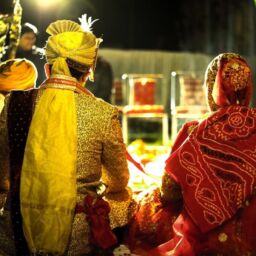INTRODUCTION
Cultural identity in India is diverse and it is preserved because of different religious personal laws as each religion has its own laws which govern the matters like marriage, divorce, etc. But, this pluralistic culture gives thrust to the debate over the equality clause in the Constitution. As it leads to unequal distribution of privileges amongst genders. Furthermore, women’s status has been sabotaged by personal laws as it gives disproportionate rights to men. Many times, legislators tried to eradicate this inequality between genders within and across the religion as per constitutional mandate.
Sometimes reforms prove to be anathema to religious freedom vide Art.25-28 which exists to preserve diversity. But this legal conundrum calls for judicial intervention to harmonize the conflict between reform and religion. But even after regular amendments and judicial pronouncements, these personal laws are still in their evolving phase, thus, it is important to identify the niche areas which should be revisited.
Inequalities in Hindu personal law
Hindu laws are mostly codified and many of its provisions are gender-neutral, but, there is still room left for improvement, thus, one must identify the areas that require intervention, which can be sub-divided in following categories;
I). Age of consent in marriage: The age of consent for marriage under Hindu Law is 18-years and 21-years for bride and groom respectively.[1] But, this distinction is non-justiciable which only promotes the stereotype in the society, that the wife should be younger than her husband. Furthermore, if the marriage takes place between adults then this differential treatment is uncalled for, thus, the age of consent should be the same for both genders.
II). Bigamous marriages: Such marriages are void in case of husband commits bigamy during the subsistence of first marriage vide s.5(i) of HMA. The child begotten from such marriage is illegitimate and thus the responsibility of maintenance of that child lies solely on the mother,[2] and only in her absence, the father can be made responsible for rearing. Thus, it is gravely discriminatory as the only mother is responsible for the rearing of an illegitimate child in case if the marriage is void.
III). Restitution of conjugal right: RCR[3] is used as a weapon by the husbands to disdain maintenance petition. And as per the changes in society, women are getting economically independent by entering in job sector after completion of education, but more often, it can be seen that RCR-petitions are used to restrain women from becoming independent and make them confined to the boundaries of patriarchal women’s household responsibilities.[4]
However, even SC upheld the constitutional validity of s.9 because of India’s cultural history and societal structure.[5]
IV). Natural guardianship: Father is the natural guardian and after him, the mother can be appointed as natural guardian.[6] The court held this provision violative of the mother’s right to equality and stated that criteria for deciding custody and guardianship should be the child’s welfare and not some unjustified preferential treatment to the father. Even the court interpreted the word “after” under this section as “in the absence” but such interpretation is fallacious as well because it covertly gives default guardianship to the father instead of considering the child’s best interest.[7]
Moreover, the burden of an illegitimate boy/unmarried girl is upon the mother under clause-(b) but in the structure of Indian society, the mother did not earn much. Thus, both the parents should equally be made responsible under this provision so that potential gender inequality will be eradicated.
V). Inequality in inheritance and succession rights: Even though Hindu Succession (Amendment) Act tried to bring gender equality by providing daughters an equal share over father’s ancestral property. But it ignored the aspect of devolution of deceased female’s property as per s.15 of the said Act, this provision is grossly discriminatory because it develops the notion that husband and his class-ii heirs have superior claim over the property of female who died without a will, in comparison to deceased female’s heirs. And even amongst heirs of deceased female, the mother comes last under s.15(1)(e).
Moreover, in s.10 of HSA, reverse gender discrimination is happening because two male descendants from the side of daughters are not included as Class-I heirs but their female counterparts are included as Class-I heirs from the daughter’s side.[8]
Gender discrimination under Muslim personal law
Mohammedan laws are quite discriminatory because of several factors like it is uncodified and slightly not according to the needs of modern society which calls for gender equality. Inequalities in Muslim law can be divided into following categories:
I). Competent Witness: When it comes to witnesses during a marriage ceremony, we see that Islamic law requires the presence of two male or one male and two female witnesses as an essential condition for a valid marriage. Here, it can be observed that in any case male witness is required for a marriage to be valid, and logically the evidentiary value under Islam of one male witness is equal to two female witnesses. It stands in contradiction to the equality clause of the constitution but such practices are still considered as an essential condition for a valid marriage under Muslim personal law.[9]
II). Polygamy: The Quran permits polygamy that is; Muslim men can marry with four wives,[10] this is grossly discriminatory in many ways; firstly, similar rights are not provided to women, secondly, it is obvious that if one’s husband marries with another woman then it not only affects the first wife mentally but financially as well because the husband has limited earning and if he enters in second/third/fourth marriage, it will lead financial hardship for the family. And in such a scenario, the status of the first wife in the household automatically gets diminished.
The court held polygamy as not an essential practice of Islam but such practice continues without any reasonable justification which not only violates the equality clause but also fosters discrimination at its root.[11]
III). Marriage: Kitabi refers to those religions which are the revelation of the book. Marriage between Muslim men and Kitabi women is valid as per Muslim law, but Muslim women are not allowed to marry kitabi/non-kitabi men and their marriage is declared as “fasid (irregular)” marriage.[12] It shows patriarchal notion in which woman is not allowed to marry non-Muslim freely and the only way they have is to renounce their religion to marry someone they want. Even when it comes to Muta/temporary marriage under Shia law, only Muslim men are allowed to enter into muta marriage, which is clear depiction of gender inequality where men have disproportionate rights than women.
IV). Divorce: Divorce laws are highly discriminatory; it gives almost no right to Muslim wife to divorce her husband. But, Muslim Husband can give talaq to his wife without assigning any reason for the same and such divorce becomes irrevocable, while a woman can give divorce only when such right has been delegated by her husband under talaq-i-tafweez[13] form of divorce or in “lian”.
Moreover, Muslim law allows any Mohammedan of sound mind and attended the age of puberty can divorce his wife at his own will without assigning any reason,[14] this means that even a minor husband can marry and divorce his wife.
V). Custody and guardianship: Muslim mother has the custodial right of minor son until he attains the age of 7 and daughter till she attains puberty. Mother has only custodial rights but the father is the natural guardian of son and daughter,[15] and even he dies, guardianship rights are not given to mother it goes to executors of a father according to Sunni school.
Even mother remarries or is engrossed in immorality/sinfulness according to religious tenets, then father can file petition to get back custodial rights from the mother.[16] Moreover, mother is not allowed to receive gifts for the child if the father is alive,[17] thus, the father has primacy over the mother in cases of custody and guardianship.
Conclusion
Hindu personal law is comparatively gender-neutral than Muslim law because for several reasons like former is codified and amended many times as per societal needs but evolution of Muslim personal law is still in its germinal phase. But we cannot say that Hindu laws are flawless, they still need quite manoeuvring to meet the demand of changing scenarios, however, several flaws are removed through legislation in recent times. On the other hand; there are certain areas like adoption, which is completely out of the purview of Muslim personal law because the Quran does not recognize adoption at all.
The binary conundrum between religious freedom and fundamental right always acted as a barrier in progressive judicial pronouncements. Law continuously evolves and when it becomes stagnant, it results in discrimination. Muslim personal law still derives most of its authority from age-old customs and Quranic laws which needs revamping according to the present scenario. Thus, no personal law is flawless and it is important to preserve diversity which should not extend to such a threshold where it violates constitutional mandates.
Author(s) Name: Kumar Aditya (Bennett University, Greater Noida)
References:
[1] The Hindu Marriage Act, 1955, (Act 25 of 1955), s. 5(iii)
[2] The Hindu Minority and Guardianship Act, 1956, (Act 32 of 1956), ss.6(c)
[3] Ibid. s. 9
[4] Suman Kapur v Sudhir Kapur AIR 2009 SC 589
[5] Saroj Rani v Sudarshan Kumar AIR 1984 SC 1562
[6] Supra note 2 at 1. s. 6(a)
[7] Githa Hariharan v Reserve Bank of India AIR 1999 SC 1149
[8] Law Commission of India, 204th Report on “Proposal to Amend Hindu Succession (Amendment) Act, 2005”, (February, 2008)
[9] Supra note 10 at 3
[10] The Holy Quran, (Surah-An-Nisa [4:3])
[11] Khursheed Ahmad Khan v State of U.P. SLP (C) No.5097 of 2012
[12] Supra note 10 at 3. Ch.XIV
[13] Md. Khan v Shahmai AIR 1972 J&K 8
[14] Ibid. Ch. XVI
[15] Imambandi v Mustaddi, 45 Cal. 878
[16] Law Commission of India, Consultation Paper on Reform of Family Law, (August, 2018)
[17] Gulamhussain Kutubuddin Maner v Abdulrashid Abdulrajak Maner (2000) 8 SCC 507
















